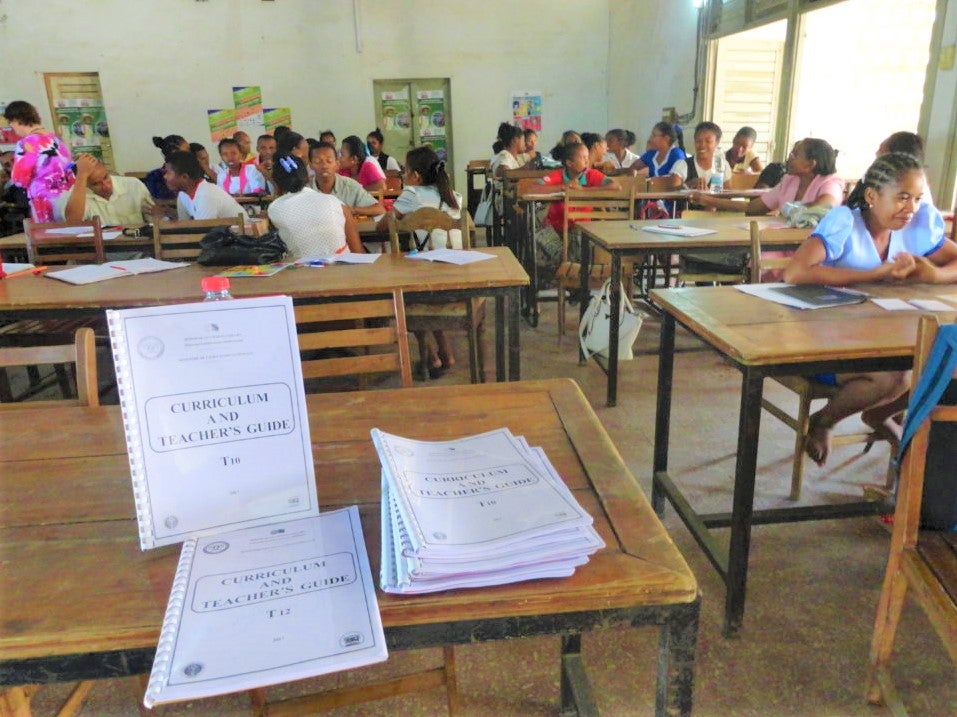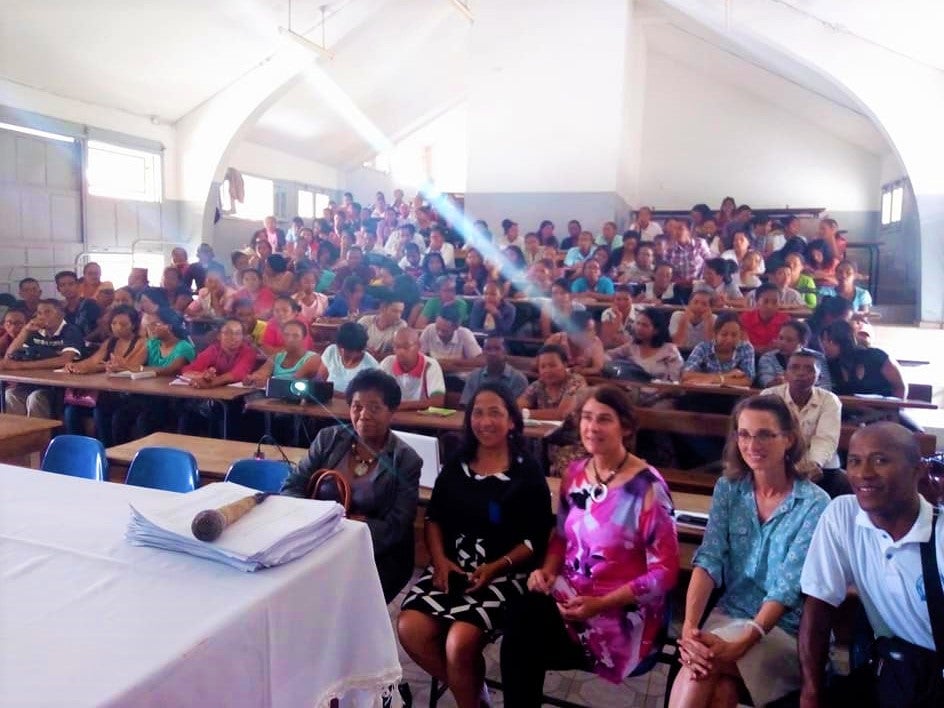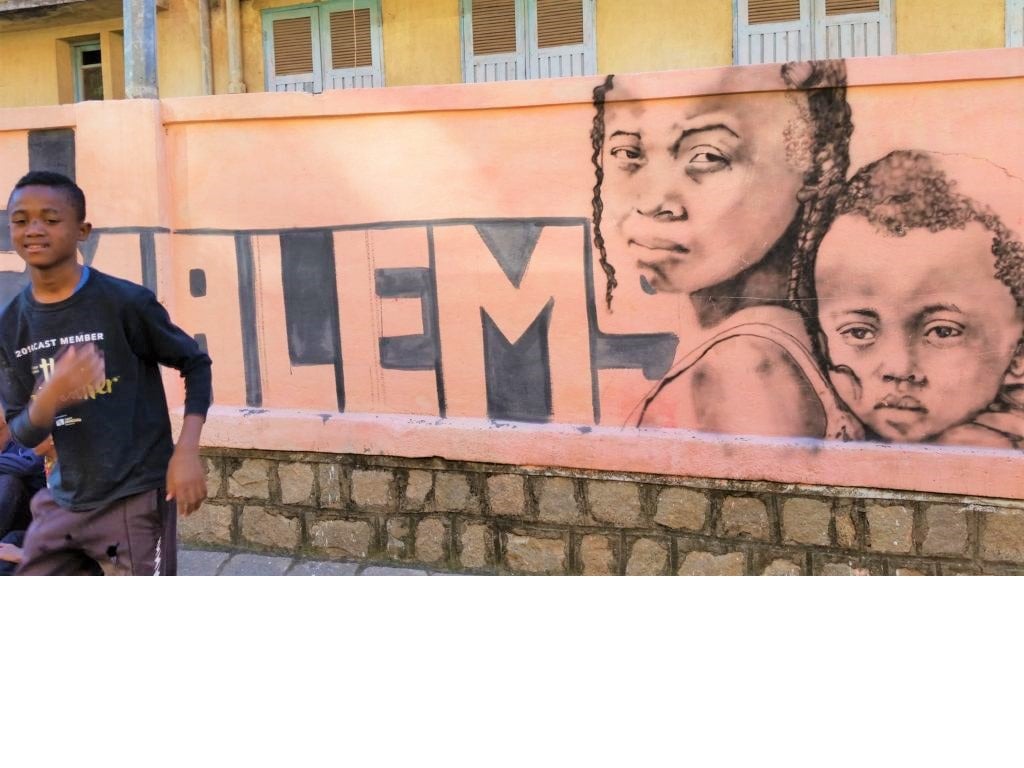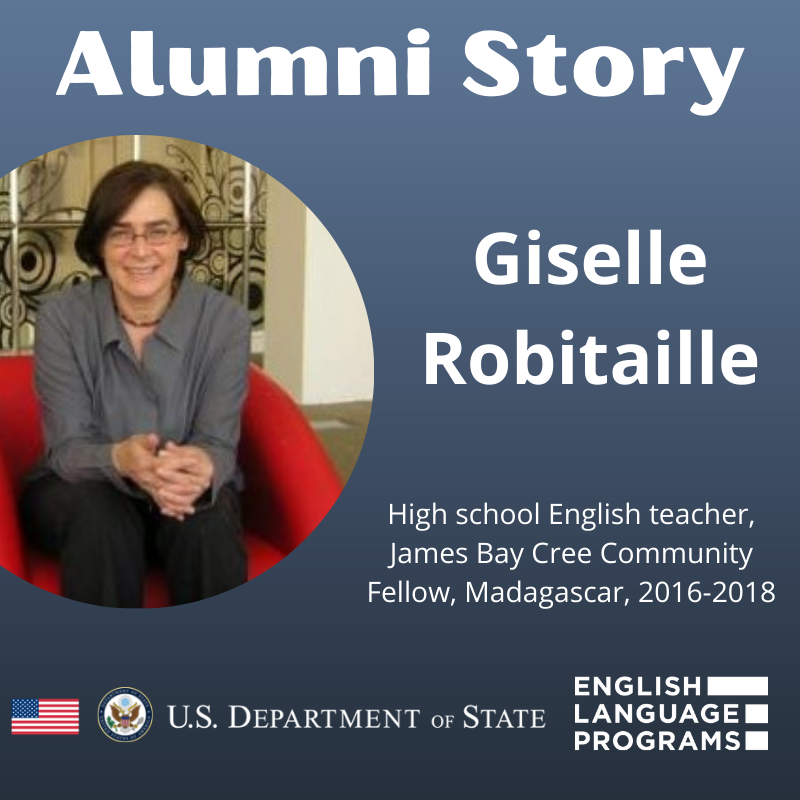Giselle Robitaille was an English Language Fellow in Madagascar, 2016-2018. At her host institution, the Madagascar Ministry of Education, her primary duty was writing a curriculum for the junior and senior high school English programs across the country. For her secondary duties, she worked on projects that helped support this endeavor: leading teaching training workshops on using the new curriculum; observing lessons to determine student needs and desires for curriculum content; and collaborating with local teachers to develop and refine the curriculum.

Building on the Work of Previous Fellow and Local Educators
With such a massive undertaking of the nation-wide curriculum design project, Giselle was grateful for the participation of many collaborators and contributors. “This was a real team effort,” Giselle states. “The project was started by Erik Lundell (English Language Specialist, 2015-2016), and I took the baton and continued researching, refining, and expanding the curriculum.”
Working in collaboration with the Madagascar/Comoros Embassy in Antananarivo, Giselle conducted a survey with regional teachers throughout the country that provided a snapshot of teacher needs, context, and demographics. The survey was then compiled into a statistical analysis report that helped the embassy make informed decisions about the allocation of public school funds and resources.
Using feedback from local education leaders and teachers who piloted the curriculum with their students and staff, Giselle was continually modifying the curriculum’s content, scope, and sequence. “The input from the local teachers was incredibly valuable,” Giselle says. “They were coming from a traditional, more teacher-centered background, where group work and student autonomy weren’t the norm. But through their willingness to try new approaches and incorporate new ideas into the curriculum, these teachers came to see the students as key resources too.”


Professional Maturation Through Great Relationships and Fellowship Autonomy
Giselle credits the ease of forming relationships with her Malagasi colleagues and the invaluable support and encouragement from her Regional English Language Officer (RELO), Kevin McCaughey, with helping her carve out her new teaching style during her fellowship. “This was really a case of experiential learning through teaching. I had a lot of freedom to explore new ideas,” she says. “Though my Malagasi colleagues were shy at first, they always showed great curiosity and engagement, which in turn gave me the confidence to try out different activities and develop new materials with them.”
Collaborating with and learning from other Fellows helped too. Giselle often teamed up with Fellow Genevieve Balderstone to give workshops on Communicative language teaching methodology, which formed the basis of the new curriculum. Two Fellow mid-year conferences– one in Dakar and one in Zanzibar–provided the opportunity to connect with regional Fellows, share stories of challenges and successes, and build her professional network. “One of our mid-year activities that I particularly loved was the Pecha-Kucha presentations,” Giselle says. In this format, you have twenty slides and twenty seconds to talk about each one. It was a really fun, creative way to learn about everyone and see some of our regional nuances.”

Learning About Social Justice from Students and Sharing the Message
One of Giselle’s favorite classes proved to be a rich learning experience for her too. For this lesson, she incorporated some of the high-quality graffiti found around the city of Antananarivo. “Madagascar graffiti provides a rich resource of familiar Malagasy images and images related to social issues,” she explains. “Using photos of the graffiti as a speaking prompt, I had my students describe the significance of the images to me, and I learned a lot from them.” For example, one image that Giselle thought depicted a game of hide and seek was actually an image of a child’s eyes being pried open by an adult and forced to see things she should not see. This image brought attention to the issue of child abuse. “The students were highly motivated and engaged in this activity,” Giselle says. “It gave them an opportunity to embrace their Malagasy identity and talk about social issues that both directly and indirectly affect them.”
After learning about a publication opportunity on the intersections between TESOL and social justice through Fellow Riah Werner, Giselle published the article, English Language Teaching: Giving Voice to Social and Cultural Issues Using Local Graffiti, describing her experience working with Access students on issues of social Justice.
“My primary goal in the end was to help my students develop their English skills so that they can express themselves to broader audiences, and continue to share their incredible culture, just as they did with me.”
A Culture of Sharing, A Community of Dance
During her time in Madagascar, Giselle was enamored by the resilient spirit of the people and the vibrant culture around her. “Life there is not without challenges,” she said. “There is poverty and pollution, and problems with infrastructure. But even with these challenges, everyone I met was very kind and caring, and always attentive to the needs of others. It’s a culture of sharing.” Giselle was happy to share accommodations with other teachers when they traveled for workshops, and she was grateful to be welcomed into their communal dances too. “The community dances were a revelation,” she says. “Everyone is bound together by the music and the movement and becomes this huge harmonious group. Ministers of education, drivers, street vendors, children, and hundreds of community members from all walks of life are swept up into a river of dance. There was an amazing feeling of equality and togetherness that I tried to emulate in our classroom.”
Fostering an atmosphere of cooperative learning and growth, Giselle encouraged her students to see themselves as global citizens whose unique voices matter to the world. “My primary goal in the end was to help my students develop their English skills so that they can express themselves to broader audiences, and continue to share their incredible culture, just as they did with me.”

After her fellowship, Giselle accepted a position as Director of the INTERLINK International Institutes center at St. Ambrose University in Iowa. Unfortunately, due to a downward trend in the number of international students traveling to the U.S. to study in American universities, the center closed in 2018. She then returned to her hometown of Halifax, Nova Scotia, and accepted a position as an ESL instructor with Immigration Canada in The Newcomers to Canada program. In 2021, she accepted a high school teaching position with the Cree School Board of Eeyou Istchee in Waskaganish, Quebec.
